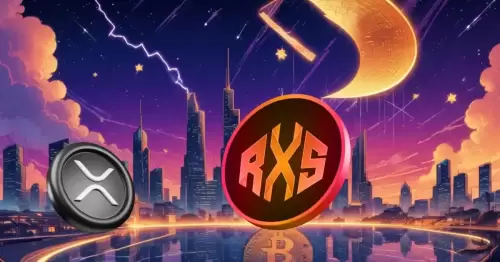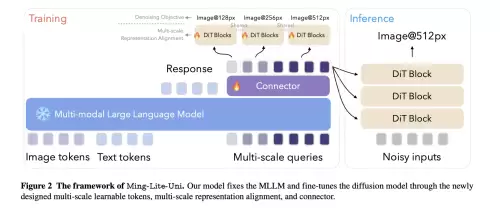 |
|
 |
|
 |
|
 |
|
 |
|
 |
|
 |
|
 |
|
 |
|
 |
|
 |
|
 |
|
 |
|
 |
|
 |
|
Cryptocurrency News Articles
Why User-Owned Data Is the New Oil Powering the Next Generation of AI
May 09, 2025 at 05:03 am
This is all data that AI companies would love to harvest. You can't build good AI without good data, which is why many view data as the "new oil"

You’re swimming in data. If your health app counts your steps? That’s new data. The Oura ring that’s tracking your bio-metrics? Valuable data. Your social media posts, even the stupid jokes that got zero likes? More data.
This is all data that AI companies would love to harvest. You can’t build good AI without good data, which is why many view data as the “new oil’ in the race for AI. The problem, though, is that while your data is valuable in theory, the reality is that it’s hard to monetize your own personal data, as you have no leverage as an individual. (Open AI isn’t knocking at your door to buy your old tweets.)
But you do own your data. And it’s valuable… if you can somehow join forces with millions of others who also own their data. This would give you bargaining power. And that’s the mission of Vana: To create an ecosystem for user-owned data, which in turn fuels user-owned AI.
That ecosystem involves a mix of Data DAOs (a “labor union” for data), decentralized data marketplaces, the recently launched VRC-20 token, and a new collaboration with Flower Labs to build the world’s first user-owned foundational model. (Exhibit A that Decentralized AI is creeping into the mainstream: The Vana/Flower collaboration was covered by WIRED.)
Anna Kazlauskas, co-founder of Vana and CEO of Open Data Labs will give a keynote at the AI Summit at Consensus 2025 discussing this vision in more detail, but she gives an overview here. And she sees the momentum shifting as more people become aware of the implications of their data and the role it plays in AI.
“We're already starting to see this shift where more people realize that, ‘My data is really important for AI’ and ‘I’m actually the owner of that,’” she says, adding that she predicts in a few years there will be over 100 million users in this ecosystem. In 10 years? “World population. Above 10 billion.”Why is user-owned data so important to you?
Anna Kazlauskas: Most people assume data is owned by the platforms that it's sitting on, but that's not the case. In the same way that when you put your car in a parking lot, the parking lot doesn't own your car. You can always take it back. You have full ownership over it.
And there's a huge amount of money being made today, mostly by big tech companies, off of that data, but users are the legal owners. So I think it's important that we restore that ownership, both from a user perspective and from a developer's perspective.
Can you connect the dots of how this helps developers?
As a developer, especially in an AI world, having access to the right data is really important. And it's super hard to do right now, because most of the data is locked up within the walled gardens of big tech. So many of my really smart friends who do stuff in AI go work at the big labs, because that's where the data is and that’s where the compute is. But that doesn't have to be the case.
How do Data DAOs fit into this vision exactly?
So a DataDAO is kind of like a labor union for data. Where basically you have a large group of people who pool their data together, and then can make collective decisions over what happens to that data.
The reason why that's important is that your data, on its own, is not that useful, right? It's much more useful when there's a big pool of it. When there’s enough of it to train an AI model.
What are some of the Data DAOs you’re most excited by?
There are a few in the health space that are really interesting. There's an early one that's actually doing full exports of patient medical records, which I think can really help advance a lot of research in the space. There's some related to biometrics, sleep, and health. There’s one with the DLP [Driver Loyalty Program] Labs; they’re building car data. And within their data-set, the Tesla data is really interesting because most people think about Tesla as valuable because they have a data lead, actually the users can get a lot of that data-set.
You’re pivoting from theory to practice with the new collaboration with Flower Labs to build COLLECTIVE-1. What’s the goal there?
We're launching COLLECTIVE-1, which is the world's first user-owned foundation model. Usually when people think about a foundation model they typically think of one company running a very large training job in a single data center, like OpenAI or something like
Disclaimer:info@kdj.com
The information provided is not trading advice. kdj.com does not assume any responsibility for any investments made based on the information provided in this article. Cryptocurrencies are highly volatile and it is highly recommended that you invest with caution after thorough research!
If you believe that the content used on this website infringes your copyright, please contact us immediately (info@kdj.com) and we will delete it promptly.
-

-

-

- Rexas Finance (RXS) Is Silently Emerging from the Shadow of Ripple (XRP) to Become the New Titan
- May 09, 2025 at 06:05 pm
- Particularly with its continuous legal saga and institutional emphasis, Ripple (XRP) has long been the star in a crypto market humming with stories. But a new titan is silently emerging in the shadow of the giants: Rexas Finance (RXS)
-

- Solana (SOL) Doesn't Have the "Convincing Signs" to Overtake Ethereum (ETH) as the Blockchain of Choice for Institutions
- May 09, 2025 at 06:05 pm
- input: Solana does not yet have “convincing signs” that it could overtake Ethereum as the blockchain of choice for institutions, as its revenue is seen as unstable
-

-

-

-

-





























































